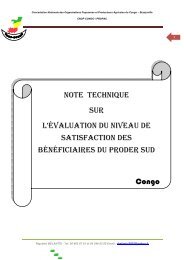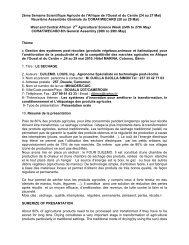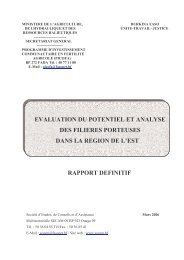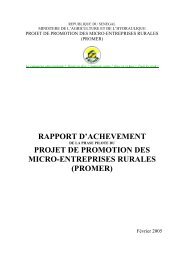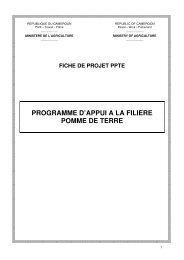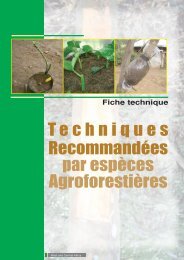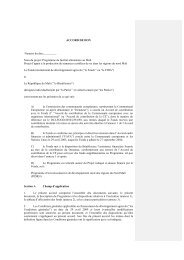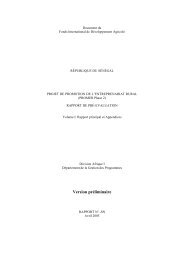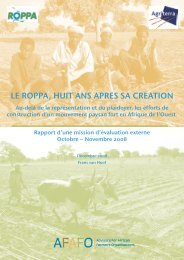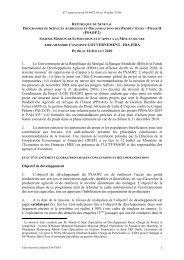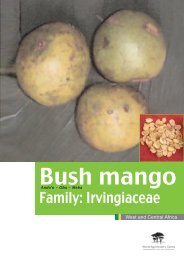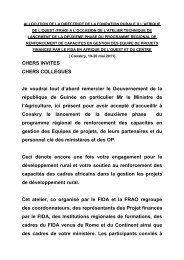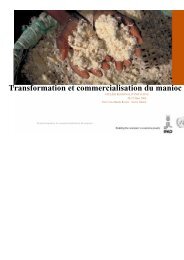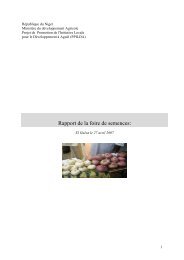Scaling Up the Fight Against Rural Poverty - FIDAfrique
Scaling Up the Fight Against Rural Poverty - FIDAfrique
Scaling Up the Fight Against Rural Poverty - FIDAfrique
Create successful ePaper yourself
Turn your PDF publications into a flip-book with our unique Google optimized e-Paper software.
• IFAD has established a track record over 30 years as a reliable, steady supporter of<br />
community based rural development, at a time when o<strong>the</strong>r donors substantially reduced <strong>the</strong>ir<br />
engagement.<br />
• As a de facto “vertical fund” IFAD benefits from <strong>the</strong> popularity that such funds enjoy in<br />
today’s development assistance, where governments and <strong>the</strong> general public in donor<br />
countries value <strong>the</strong> <strong>the</strong>matic focus, results orientation and accountability of vertical funds.<br />
• IFAD remains relatively small, as <strong>the</strong> fifth largest provider of ODA for agriculture, forestry<br />
and fishing, but with additional resources and building on its evolving institutional focus on<br />
scaling up it can punch much above its weight in terms of impact.<br />
Despite <strong>the</strong> importance which <strong>the</strong> scaling up agenda has for IFAD, it is critical to remember that<br />
scaling up is not an end in itself, but a means to achieve greater and more wide-spread benefits for <strong>the</strong><br />
rural poor whom IFAD has been set up to serve.<br />
C. How was <strong>the</strong> scaling up review for IFAD carried out?<br />
As noted above, <strong>the</strong>re is no prior experience and not blueprint for an institutional scaling up review.<br />
The approach chosen <strong>the</strong>refore represents an experiment from which we should draw lessons not only<br />
for how to scale up IFAD’s activities, but also for how to carry out institutional scaling up reviews.<br />
In <strong>the</strong> absence of any model, we designed a pragmatic approach that reflected <strong>the</strong> interests of IFAD,<br />
<strong>the</strong> resource limitations imposed by <strong>the</strong> IFAD grant supporting <strong>the</strong> review, by <strong>the</strong> tight time table (one<br />
year from start to finish) and by <strong>the</strong> interests and capacity of <strong>the</strong> expert team assembled for <strong>the</strong> review.<br />
The review is based on <strong>the</strong> analytical framework for scaling up developed by Hartmann and Linn<br />
(2008), which stresses <strong>the</strong> importance of creating pathways for scaling up, involving vision, drivers<br />
and spaces along with monitoring and evaluation. One of <strong>the</strong> new features introduced into this<br />
framework is <strong>the</strong> recognition that scaling up is part of a continuum of innovation, learning and scaling<br />
up processes, which need to interact and be promoted toge<strong>the</strong>r, but which also need separate<br />
consideration, distinct institutional capacities and differentiated process support.<br />
The analysis is based on six strands of empirical work:<br />
• A “macro” assessment of IFAD’s comparative standing in terms of aid effectiveness and scope<br />
for scaling up based a newly developed indicator of aid agency effectiveness.<br />
• Review of documentary evidence regarding IFAD’s strategies, operational guidance<br />
documents and evaluation results.<br />
• Two in-depth country case studies with field visits and exchanges with local stakeholders<br />
(Peru and Moldova).<br />
• A review of documentation for two <strong>the</strong>matic areas (environment and natural resource<br />
management, and value chains).<br />
• Interviews with IFAD managers and staff during four visits to IFAD headquarters, including<br />
three widely attended learning events for operational staff held in connection with <strong>the</strong>se visits.<br />
• Engagement of review team members with various o<strong>the</strong>r IFAD activities.<br />
The team ga<strong>the</strong>red relevant information on many areas of IFAD’s internal management of <strong>the</strong> scaling<br />
up process. However, not all <strong>the</strong> information has equal depth nor does it allow an equal degree of<br />
certainly of results and recommendations. We see this scaling up review as a first step in IFAD’s<br />
journey towards becoming a scaling up institution. From <strong>the</strong> beginning this review was designed as<br />
Phase 1 of a multi-phased process. As part of a next phase, our analysis and recommendations need to<br />
be carefully vetted, with more evidence collected where necessary, with a more detailed design of<br />
actions to be taken and with a process of institutional change that assures wide buy-in from IFAD’s<br />
Executive Board, management and staff, and ultimately from IFAD’s clients and partners.<br />
7



